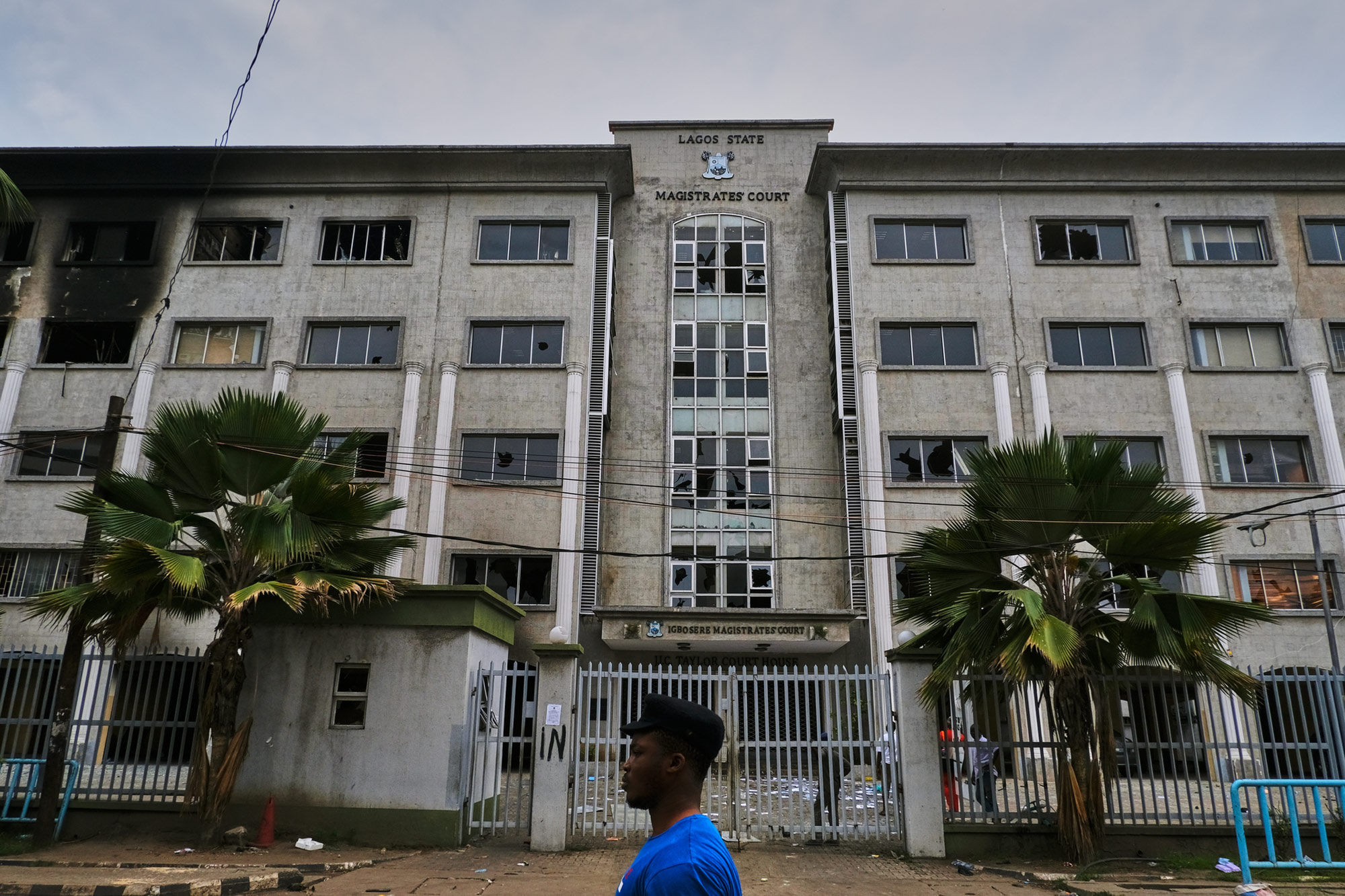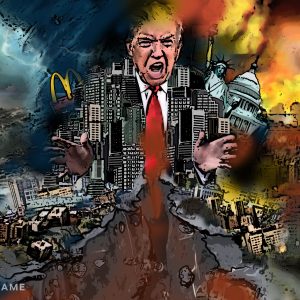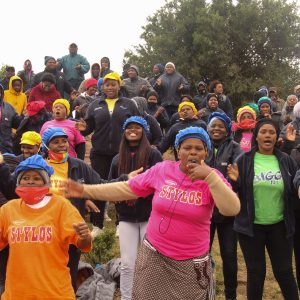Nigerians demand justice for massacre victims
Public hearings have begun into allegations of police brutality while the International Criminal Court is analysing evidence related to the #EndSARS killings at Lekki tollgate.
Author:
9 November 2020

No one has taken responsibility for the 20 October 2020 Lekki tollgate massacre in which more than a dozen people were killed when Nigerian army and police officers opened fire on protesters. People were demonstrating against the Special Anti-Robbery Squad (SARS), a brutal police unit that has been acting with impunity for years. The government has neither held tributes to the victims nor issued an apology to citizens.
Nigerian President Muhammadu Buhari only addressed the country two days after the massacre. His speech, in which he ignored the Lekki tollgate incident, seems to have abruptly suspended the vibrant #EndSARS protests across cities.
His “appeal” to protesters was a thinly veiled warning as he urged them not to be “used by some subversive elements to cause chaos with the aim of truncating our nascent democracy”.
“For you to do otherwise will amount to undermining national security and the law and order situation. Under no circumstances will this be tolerated,” Buhari said.
Related article:
On 27 October, exactly a week after the massacre, the Nigerian Army – which had explicitly labelled their presence at the scene “fake news” – confessed that they were called in by the government. This is in contrast to Lagos State Governor Babajide Sanwo-Olu’s claim that the call was made by “forces beyond his control”.
Acting deputy director of public relations and 81 Division’s spokesperson Osoba Olaniyi, however, insisted that army personnel did not shoot at peaceful protesters, despite what footage shows. Sanwo-Olu is yet to give a response.
On 21 October, a day after the massacre, Fatou Bensouda, a prosecutor at the International Criminal Court (ICC), said that they are “closely following” events in Nigeria from The Hague in the Netherlands.
Obinna Agwu, a Nigeria-based lawyer, says: “The ICC prosecutor [already] commented that they are observing events in Nigeria. So, of course, the government [is] afraid. [They don’t want it to] get to a point where it’d be a crime against humanity. That is why they are denying [its involvement in the massacre].”
Ademola Bashiru, an attorney living in and protesting for the #EndSARS campaign from Ireland, calls this “distorted facts”.
“Before we can talk about the ICC, [the massacre] needs to be properly investigated … from the video … we have. [The government has tried its] best to deny it, and now they’ve said – because obviously they’ve seen the videos – they’ve said, ‘Oh, it really happened, the military did that’,” Bashiru says.

He is part of a large number of Nigerians in the diaspora mounting pressure through continued protests. On October 31, he was at another gathering in Ireland to educate people about police brutality in Nigeria. “We are really pushing,” Bashiru says. “We’re getting to speak to the mayor of Cork, where I live, getting to international bodies with videos and evidence of what happened, just to ensure that whoever ordered the killing [will] be penalised.”
The Nigerian diaspora is also calling for a visa ban of Nigerian state officials and police by the United Kingdom, the United States and Canada.
“Our politicians love to travel and if they don’t have access to that they’d be a little frustrated. If the international community are successful with this they would go ahead and investigate to get who ordered the killing and prosecute,” says Bashiru.
Accuser, investigator, judge
The ICC told the British Broadcasting Corporation that it would analyse the evidence it received from the massacre after critics accused the government of a mass cover-up.
Like several other states, the Lagos State government has set up a judicial panel to help victims of police brutality. This was one of the demands of the protesters, and the president has given his full support.
The Lagos panel is headed by retired justice Doris Okuwobi, with public hearings scheduled to be held three times a week for six months at the Lagos Court of Arbitration in Lekki.
On 27 October, the hearings kicked off with victims coming forward to share harrowing experiences at the hands of SARS officers. The next panel, held on 30 October, saw two short sittings and a tour of the charred Lekki tollgate plaza, led by a representative from the Lekki Concession Company, the outfit that handles the toll’s operations.
At least six bullet casings were found on the road, which is open again. A closed-circuit television camera, which seems to have stopped working at around 8pm and so could have been functioning during the shooting, was also resuscitated.
Related article:
The panel then made an unscheduled stop at the military hospital in Lekki after several eyewitnesses reported that the army loaded its trucks with the injured and lifeless bodies of protesters. Alongside a pathologist, the panel insisted on inspecting the hospital’s morgue. After initial resistance from the army, an empty building under construction was presented as the morgue.
The New Nigeria Network, a group set up during the #EndSARS protests to amplify the movement, was present during the hearings, with members singing and holding a banner that read: “Gov Sanwo-Olu lacks competence to set up any panel on Lekki shooting of 20/10/20.”
According to group co-convener Adesina Ogunlana, “The governor of Lagos State is an involved party. You can’t be your accuser, investigator and judge. Ordinarily, the governor has the competence [to set up a judicial panel] but in this case, he’s an involved party and cannot be an investigator of his case.” On 7 November, the army appeared before the judicial panel claiming they had shot blank ammunition at protestors.

#SayNoToSocialMediaBill
Soon after the massacre, the Nigerian Broadcasting Corporation (NBC), the country’s media regulator, sanctioned and fined three local television outlets for using “unverifiable video footage” of the shooting from social media.
As events were taking place, the NBC released a statement urging broadcasters to approach coverage of the attack with caution, asking them not to do anything that would “embarrass the government”.
The government’s latest reaction has been the push to regulate social media, as they look to curb the rise of “fake news”, which may “destabilise” the country.
According to Lai Mohammed, Nigeria’s minister of information, “Social media has come to stay, and it will be an antithesis to democracy to shut it down because it is the fastest way of disseminating information.
“However, we must regulate social media in a manner that it does not become a purveyor of fake news and hate speech. We will not fold our arms to allow purveyors of fake news and hate speech to use social media to destabilise the country.”
On 2 November, governors of the northern Nigeria states intensified calls for a halt to free speech and online expression, as they claimed it derailed the ambitions of the #EndSARS protest.
In December 2015, the first attempt to regulate social media was made. Jail time and a $10 000 fine were punishments for posts found contrary to the proposed law. After six months, the bill was withdrawn following heavy public criticism.
Related article:
Now the government is looking to pass the Protection from Internet Falsehood and Manipulation Bill and the National Commission for the Prohibition of Hate Speech Bill. Last year, the former passed a second reading at the senate but, after being met with resistance from the public, was kicked out. But in the wake of the #EndSARS movement, the government is again agitating to control conversations on social media platforms.
Social media helped disseminate information, making the #EndSARS protests flourish. With a halt to physical protests, it is the only medium left for protesters to show their indignation and demand complicit politicians be tried.
Now used alongside #EndSARS, #SayNoToSocialMediaBill is the new hashtag dedicated to fighting the bills.
“There have been many bills since 2015 that attempt to ‘end fake news and hate speech’,” explains digital rights activist Gbenga Sesan, “but they have all proved to be excuses to censor free speech. Politicians are now using recent events … to renew the call for censorship [of] platforms they consider threatening.”



